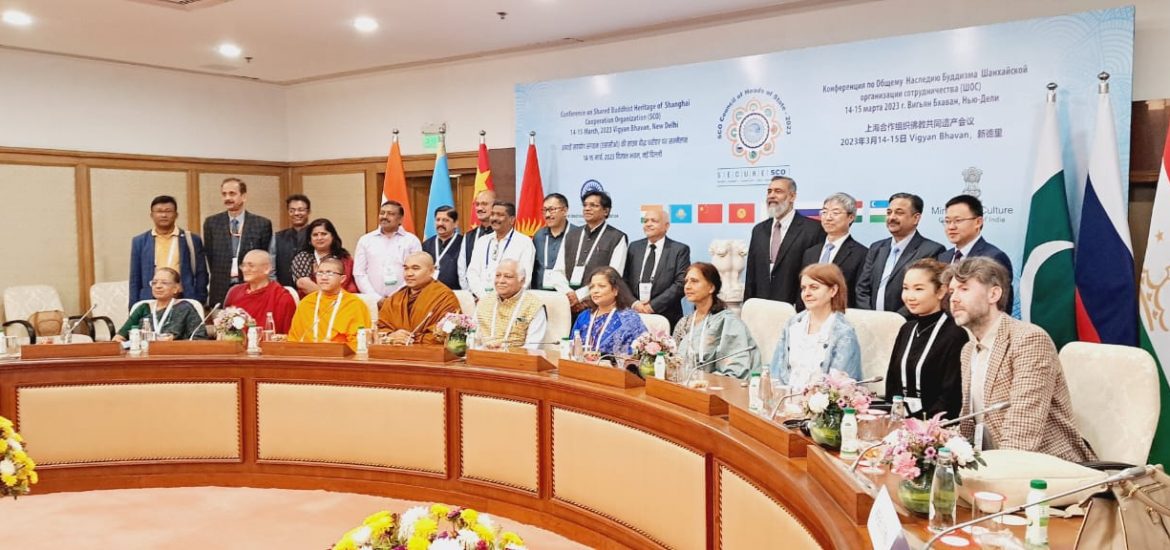In this month’s BDG Postcard newsletter, I highlighted how March was an interesting few weeks for Buddhist diplomacy in South Asia. Eyes have recently been on the Indian front, since New Delhi hosted the “Shared Buddhist Heritage” conference from 14–15 March. India currently enjoys the rotating presidency of the Shanghai Cooperation Organization (SCO), which hosted this month’s symposium with India’s Ministry of Culture, the Ministry of External Affairs and the International Buddhist Confederation (IBC). IBC was founded in 2013 and has traditionally been the unofficial outlet of the Indian government’s Buddhist outreach.
Dr. Chandan Kumar’s unpacking of the event notes that the SCO is more than simply a multilateral body among many: it is the world’s largest regional organization when it comes to geographic scope and population. The SCO spans 60 per cent of the mega-continent of Eurasia, with associated countries holding over 30 per cent of global GDP, and encompasses 40 per cent of the world’s population. If the future of our world has Eurasia as its core, the SCO undoubtedly plays a critical role in the multilateral diplomacy of Eurasian countries.
India is a relatively recent SCO member, having formally entered in 2017. In the media, the SCO is traditionally portrayed as being guided by the diplomatic priorities of China and Russia, its most prominent members. However, India is not only presiding over the group until the end of this year, but also holds the G20’s rotating presidency in 2023. This highlights India’s potential mediator role between different multilateral blocs, which often diverge in philosophy and priorities.
India’s dipomatic clout has led to what seems to be a renewed attempt to reconnect with the other members of the SCO through Buddhism. After all, members include not only Russia and China, but also Pakistan, Kazakhstan, Tajikistan, and Myanmar, which are all countries with varying degrees of Buddhist history and living heritage. Myanmar is one of the obvious Buddhist heavyweights. India should be credited for bringing Buddhist heritage into the fold of the body’s multilateral dialogue for the first time.
This renewed push will be followed up by the IBC’s Global Buddhist Summit from 20–21 April at the Ashok Hotel. The Ashok Hotel is nestled in the illustrious Chanakyapuri district of New Delhi, the traditional haunt of diplomats and foreign delegates. The Indian PM, Narendra Modi, is expected to attend, and the heads of sanghas from across Asia, scholars, and other guests are expected to discuss themes like evolving Buddhist responses to environmental degradation, the preservation of the Nalanda tradition (the Indo-Tibetan connection), and pilgrimage and living heritage.
These are familiar, go-to concepts that IBC began exploring many years ago when Mr. Modi launched his “first period” of Buddhist diplomacy in 2015, under the Samvad series in close collaboration with the late ex-Japanese PM Shinzo Abe. In fact, the Ashoka Hotel was host to this first Samvad conference, in collaboration with the defense-oriented Vivekananda Foundation and Tokyo Foundation.
This month’s symposium, and next month’s IBC meet, perhaps signals a very tentative soft launch of a “second period” of Buddhist-centered diplomacy by India. I venture to note this because this is a world that has irrevocably changed since the early days of Mr. Modi’s Samvad program. Obama was still US president, and no one foresaw the election of Trump in 2017. Even though we were well into the smartphone and social media age, AI had not risen to its present prominence. The world had not yet been ravaged by COVID. To a large extent, the world is now bifurcated between mutual American and Chinese hostility, and Buddhist diplomacy will be ever more complex as countries with Buddhist institutions adjust to this medium-term geopolitical reality.
Yet the SCO offers something potentially unique for Buddhists, especially given China and Russia’s influence. How IBC responds to present geopolitical tensions will be worth observing, as will whether other countries with Buddhist interests like Pakistan or Myanmar start seeing the SCO as a platform for their own Buddhist outreach.


